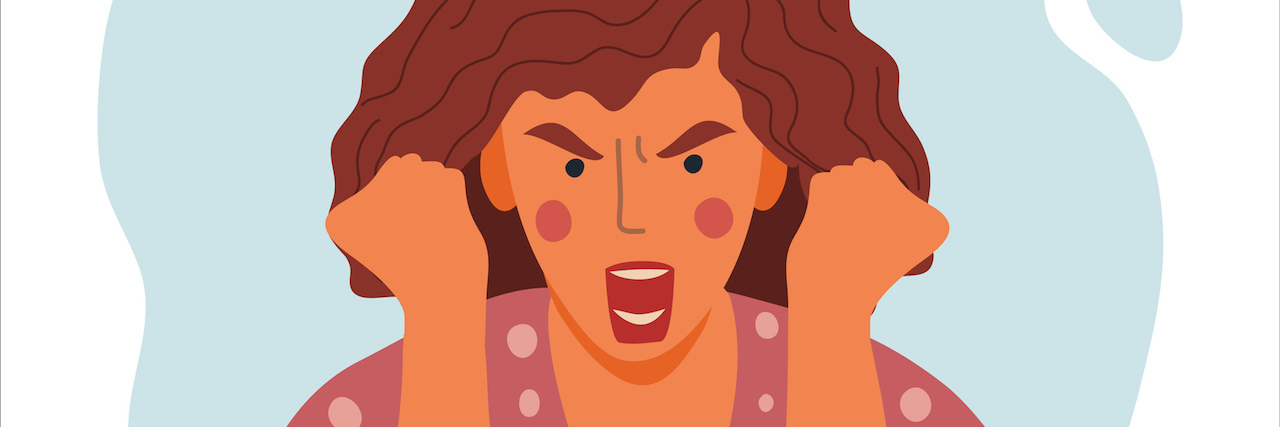When Grief Comes Out as Rage
Editor's Note
If you’re looking for creative inspiration, check out the Daily Inspirations group on The Mighty.
When I’m anxious, I’m irritable. I know that about myself. I get snappy and defensive. I get what I have called anger-anxiety. I wrote “When Anxiety Presents as Anger, Not Fear” one night in a panic after having had an outburst at work.
I thought it was the stress that had gotten to me. I was so stressed with work. There was a very important piece of the puzzle that I was missing. I wasn’t seeing the big picture. But now, I see a pattern that I would like to share: my Granny had just died. I lived too far away and couldn’t go home for her funeral, so I FaceTimed with family. I cried. I thought I was ready to move on. The grief was still there, festering below the surface. When I couldn’t suppress the grief any longer, it came out. It came out as rage. When I realized it, I started to think back further. All of my most extreme outbursts — the times I yelled at coworkers and bosses, the time I interrupted a professor during class to tell off a classmate and the time I tried to throw the dishwasher at my sister during a fight in college –every single one lines up perfectly in my history with a time of extreme grief in my life.
My dad died in December. He was the best person I have ever known. He taught me so many things, the most important being how to be kind. He taught me that everyone makes mistakes. Mistakes can be fixed. I cling to that thought when I feel like everything I’ve ever done was wrong. I think of the time he told me, “You are good. Use your powers for good.” But, right now, I don’t feel good. I am angry. I am livid. I can’t even say why. I just feel it. The anger is rising again. It’s ready to blow. The tiniest trigger fills me with rage. I take every innocent comment offensively. I am walking around about to explode, and only those closest to me know when to clear a path. I had a meltdown at the airport because I left my phone past security and no one would help me get it back. There were videos of my dad on my phone.
When so many people responded to my post describing this incident, my first reaction was humiliation; what if people I knew read it? This is embarrassing. I don’t want people to know I have this problem. Then I saw more and more comments from people saying they can relate. People asking for advice or suggestions for themselves or their children. I realized: this isn’t just my problem. There are others out there who are looking for help. I said in that post that medication helped me. That is true; but there are lots of things besides medication that help. Things that I work on every day to fight my anxiety and anger. I have worked on it all my life, and I have worked with children all of my adult life.
I struggle every day to be kind. I struggle because life happens and sometimes I can’t help but be grouchy. I can’t help but be down sometimes. When I’m down, I’m just really down. I cherish the moments of happiness. I search for bright spots in my life because the dark spots seem so dark. It’s the most helpful tool I use. I use my energy to actively look for times in my life when someone is kind to me or others, and I celebrate them. I actively try to be kind at all times. That way, when I can’t control it, people may understand: I’m not always grouchy. Just when I can’t help it.
When I work with kids, I teach and try to model kindness, fairness and honesty with every lesson. Learning kindness is also learning self-control. It’s a skill to be able to overlook your own feelings of anger to listen to someone else’s perspective. It’s a skill to look at a situation and know how to help. It’s a skill that I have spent my whole life learning, and I still mess up. Expecting kids to not only know what to do, but to be able to do it without help, is setting them up for failure. I point out and praise every tiny success in being helpful or kind to others. I brag on the kids I work with to anyone who will listen, while they are there to hear it. I tell their teachers and parents excitedly when they let another student go ahead in line, or asked a classmate if they were OK after tripping, and the student beams. I point out the bright spots, and encourage others to recognize and praise these small successes with me. The small successes become bigger. Letting a classmate ahead in line once becomes calling time-out at recess to see if a member of the opposite team is hurt, instead of joining in when the other kids laugh.
Teaching kindness builds self-control, empathy and understanding. It creates a buffer for impulsive and aggressive behavior. With practice, kids are able to stop themselves and think: is there something else I could do in this situation? Do I have to fight? If there is another option, they will usually take it. It’s human nature to take the easiest route available. The easiest visible route. Anger clouds the mind. The clouds need to be cleared before the path can be seen. Clear them with kindness.
Originally posted on BrightSpotsHD.com
Getty image via Kupalina

